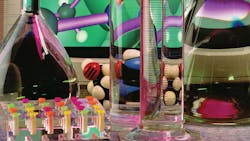Expansion Management: Advanced Manufacturing Makes Inroads in Massachusetts
There is talk and there is action. Massachusetts is opting for action. Declaring that advanced manufacturing is a central opportunity in the state's growth strategy, Gov. Deval Patrick organized the first statewide Advanced Manufacturing Summit in June.
Hundreds of manufacturing executives were brought under one roof to share best practices on how to do business with OEM customers as well as discuss the challenges of introducing new process technologies. Tips on how to adopt new quality standards, cut energy bills, expand markets and get financing were also offered.
See Also: Manufacturing Plant Site Location Strategies
"Because we are making more of the things we invent in our innovation economy, manufacturing is making a comeback," Patrick said in addressing the gathering. "In fact, precision or advanced manufacturing is in the midst of a quiet renaissance. Your companies and many others like them have transformed from the traditional image of mass-manufacturing to a new industry built on innovative technology, custom design, high quality and international competitiveness."
To help companies continue the momentum, the state launched the Advanced Manufacturing Regional Partnership Academy, which is tasked with improving the effectiveness of regional hands-on education in precision manufacturing.
State-sponsored programs in manufacturing have worked in the past. The Life Sciences Initiative, a 10-year, $1 billion investment package funded in 2008 to push advancement in the sector, has made a measurable impact on job creation and spurred economic growth across the state, according to a report by the Boston Foundation released in March. In fact, Boston takes the number one spot as the premier R&D cluster in the world, with more than 74,000 life sciences employees, according to a report from Jones Lang LaSalle.
The sector is continuing to grow, with two large players expanding operations this year. Bristol-Myers Squibb Co. (IW 500/69) launched a $250 million expansion of its manufacturing complex at its Devens location, nearly doubling the size of its workforce.
And Johnson & Johnson (IW 500/17) opened its Boston Innovation Center, which will work with area universities, academic centers and small biotech companies in the area with the goal of "catalyzing early-stage innovation, bringing transformative medical solutions and driving growth" for Johnson & Johnson, the company said.
EMD Serono, Inc., a subsidiary of Merck KGaA, Darmstadt, Germany, also continued its expansion this year. "The Greater Boston area remains one of the top locations for state-of-the-art drug development," said James Hoyes, president of EMD Serono. "Here we can attract and retain best-in-class talent in the biopharma and life sciences industry. We are confident that by increasing hiring in the U.S., we can continue to foster innovation and a culture anchored in new possibilities."
Such expansion contributes to a promising manufacturing future in the state, as reported in "Staying Power II – A Report Card on Manufacturing in Massachusetts 2012." Over the next five years (2012-2017), 65.4% of manufacturers expect to continue production at increased levels, and 70% plan to hire more workers.
| Read about how tech manufacturers locating in the U.S. are driving increases in employment at iw.com/tech-workers. |
The talent pool is a driving factor when companies consider locating or expanding in the state. "The benefits of manufacturing in this state include a talent pool that is strong for fast growing companies; local suppliers that take a true partnership approach; and manufacturing here has a cool factor," said Amy Villeneuve, president of Kiva Systems, at the MassEcon Annual Conference, "Manufacturing Transformed: What's New and What's Next?"
